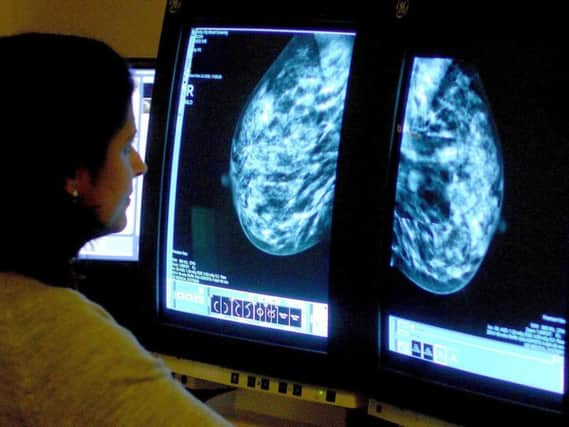Cancers being detected earlier, NHS figures show


One in four (25.5 per cent) of the 24,786 patients found to have breast, colorectal or lung cancer in 2017-2018 were diagnosed at the earliest stage (stage one).
This is a 9.4 per cent relative increase from the baseline percentage of 23.3 per cent, with the baseline based on combined figures from 2010-2011.
Advertisement
Hide AdAdvertisement
Hide AdData from NHS National Services Scotland showed people living in the most deprived areas are less likely to be diagnosed at an earlier stage than those from least deprived areas.
For people with breast, colorectal or lung cancer in the most deprived areas, 22.6 per cent were diagnosed at stage one between January 1 2017 and December 31 2018, compared with 29.1 per cent in the least deprived areas.
• READ MORE: Trial to help patient fears over cancer returningThis was an 11.8 per cent increase from the baseline figure for people in deprived areas.
Public Health Minister Joe FitzPatrick said: "These new figures show an increase in the number of people diagnosed at the earliest stage of bowel, breast and lung cancer in Scotland compared to 2010-11.
"It's particularly encouraging to see that the largest increase in the proportion of stage one diagnoses of bowel, breast and lung cancers combined has been in the most deprived areas of Scotland - an 11.8% increase.
"More people are surviving cancer than ever before, with urgent cancer referrals fast-tracked.
"Cancer death rates have decreased by more than 10% in the last decade and early detection is crucial to this."
He added: "More than £200 million will deliver six elective treatment centres to allow people to be diagnosed and treated more quickly for planned surgery.
Advertisement
Hide AdAdvertisement
Hide Ad"Our Detect Cancer Early (DCE) Programme has been developed to remind people across Scotland of their resilience and strength in the hope that they'll act early to give themselves the best chance of finding cancer early."
In 2017, 16,105 people died of cancer in Scotland and approximately 32,200 people were diagnosed with the disease.
The Scottish Government said overall cancer mortality rates have dropped by 10.1% over the past 10 years in Scotland.
Gordon Matheson, Cancer Research UK's public affairs manager in Scotland, said: "It's welcome that the Detect Cancer Early programme has seen a small increase in the number of people in Scotland being diagnosed early with cancer.
"However, it remains unacceptable that those living in Scotland's poorer communities have significantly less chance of being diagnosed at an early stage when treatment is more likely to be successful.
"For this to change it's essential we see more tailored resources being targeted at Scotland's poorer communities.
"The Scottish Government must also ensure that there's enough staff to do this vital work, if we are to meet current and future need."